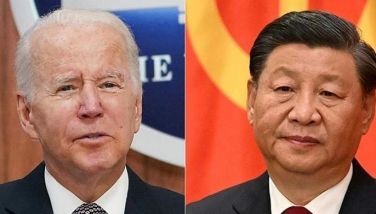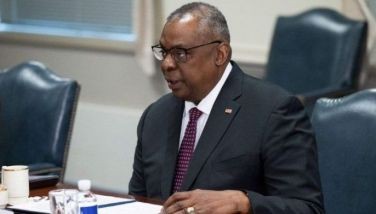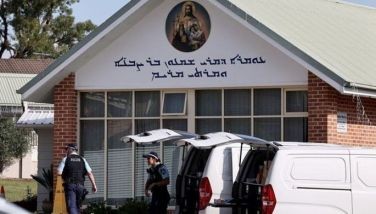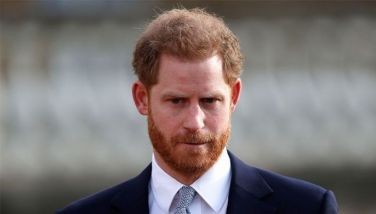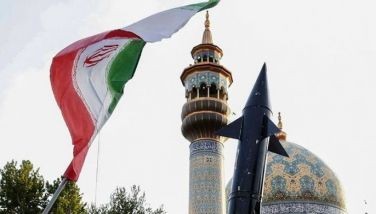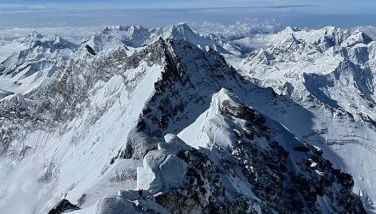Hong Kong makes first security law arrests as thousands defy protest ban
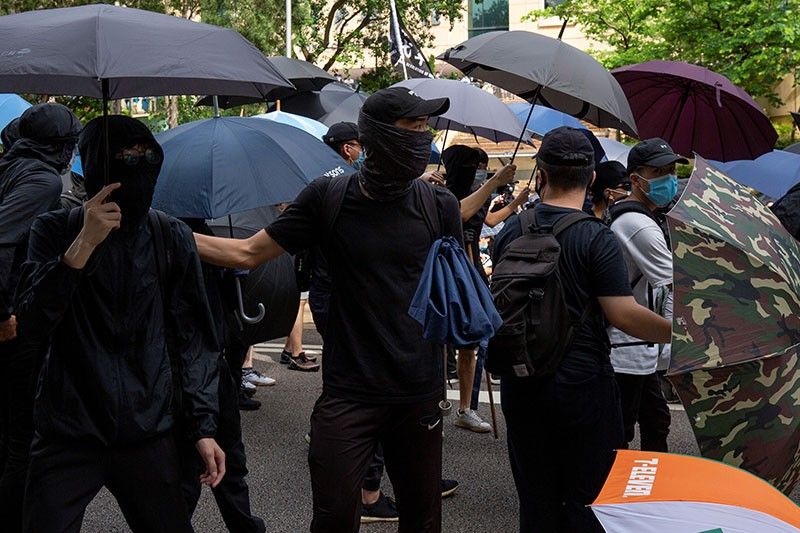
HONG KONG, China — Hong Kong police arrested about 370 people Wednesday — including 10 under China's new national security law — as thousands defied a ban on protests on the anniversary of the city's handover to China.
Police used water cannon, pepper spray and tear gas in a series of confrontations with protesters, one day after China drew global criticism for imposing the controversial legislation on the financial hub.
Beijing said the law would restore stability after nearly a year of unrest, but instead it sparked the worst street violence in months.
Police said seven officers were injured — one was stabbed in the shoulder as he tried to make an arrest, and three others were hit by a "rioter" on a motorcycle.
Under the new law, certain political views and symbols became illegal overnight — including showing support for Hong Kong, Taiwan, Xinjiang and Tibet independence.
Details released by police Wednesday accused those arrested under the new legislation of possessing independence flags, stickers and flyers.
"Advocacy for independence of Hong Kong is against the law," security minister John Lee told reporters.
Still, many of those protesting chanted independence slogans — itself now against the law.
"What this authoritarian regime wants to do is to terrorise the people and stop them from coming out," Chris To, a 49-year-old protester, told AFP.
Broken promise?
Opprobrium over the law poured in from critics and western governments — led by the United States and Britain — over fears the law will usher in a new era of mainland-style political repression.
Under a deal ahead of the 1997 handover from Britain, authoritarian China guaranteed Hong Kong civil liberties as well as judicial and legislative autonomy until 2047 in a formula known as "One Country, Two Systems".
British foreign secretary Dominic Raab said the law breached that agreement, a registered treaty.
Britain also said it would push ahead with previously announced plans to extend a possible path to citizenship for some three million Hong Kongers.
Washington has vowed unspecified counter-measures, but Democratic presidential hopeful Joe Biden slammed the administration of Donald Trump for not doing enough.
Biden said Trump had "surrendered our values and reassured China's autocrats they have a like-minded partner in the White House."
Beijing said foreign countries should keep quiet about the law, while Hong Kong leader Carrie Lam hailed the legislation as the "most important development" since the city's return to Beijing's rule.
Polarising date
After huge and often violent pro-democracy protests last year, authorities have shown zero tolerance for even peaceful rallies in recent months.
Gatherings of more than 50 people are banned anyway under anti-coronavirus regulations — even though local transmissions have ended.
But the July 1 anniversary has long been a polarising day in the city.
Beijing loyalists celebrate Hong Kong's return to the Chinese motherland after a century and a half of what they consider humiliating colonial rule by Britain.
Early Wednesday, helicopters flew across Victoria Harbour carrying Chinese and Hong Kong flags, while a barge chugged past hailing the law in giant Chinese characters on scaffolds.
Democracy advocates have long used the handover date to hold rallies as popular anger towards Beijing swells — although this year's event was banned for the first time in 17 years.
During huge pro-democracy demonstrations last year, the city's legislature was besieged and trashed by protesters.
Chinese jurisdiction and life sentences
The "One Country, Two Systems" formula helped cement Hong Kong's status as a world-class business hub, bolstered by an independent judiciary and political freedoms unseen on the mainland.
But critics have long accused Beijing of chipping away at that status and describe the new security law as the most brazen move yet.
It was passed in just six weeks, skipping Hong Kong's fractious legislature, and the precise wording was kept secret until it came into effect late Tuesday.
It outlaws subversion, secession, terrorism and colluding with foreign forces to undermine national security, with sentences of up to life in prison.
It also topples the legal firewall that has existed between the city's judiciary and the mainland's party-controlled courts.
China will have jurisdiction over "serious" cases and its security agencies will also be able to operate publicly in the city for the first time.
Another provision also claims universal jurisdiction for national security crimes committed beyond Hong Kong or China.
Authorities in Taiwan opened a new office to deal with Hong Kongers seeking refuge.
Beijing says the law will not end Hong Kong's freedoms but critics have little faith in those assurances, given how similar national security laws are routinely used on the mainland to crush dissent.
Millions march in Hong Kong in a powerful rebuke of an extradition law feared to expose them to China's capricious justice system.
Hong Kong national security police on Thursday detained four people, including the brother of prominent activist Dennis Kwok, one of eight fugitives with bounties on their heads for allegedly breaching national security.
The city's national security department "took in two men and two women from various districts in Hong Kong and Kowloon for investigation," a police source told AFP.
Among the four was the elder brother of former democracy lawmaker Dennis Kwok, who is currently in the United States.
"(Kwok's elder brother) is now under investigation in the Western District police station," the source said.
Three others, "two women and a man", were taken in Tuesday by the national security department, authorities told AFP earlier Thursday.
AFP has requested comment from police on the most recent detentions. — AFP
Three family members of exiled democracy activist Nathan Law have been taken in for questioning on Tuesday, days after authorities issued a bounty on him and seven others accused of breaching the city's national security law.
Police officers from the national security department brought in Law's parents and elder brother without formally arresting them, a police source confirmed to AFP.
"It's understood that officers from the NSD took three people -- Nathan Law's parents and elder brother -- in for questioning," they said.
"So far, no arrest has been made." — AFP
The United States condemns Hong Kong authorities for issuing bounties linked to democracy activists based abroad, saying the move sets a dangerous precedent that could threaten human rights.
Hong Kong police offered bounties of HK$1 million (about $127,600) for information leading to the capture of eight prominent dissidents who live abroad and are wanted for national security crimes.
"The United States condemns the Hong Kong Police Force's issuance of an international bounty" against the eight activists, State Department spokesperson Matthew Miller says in a statement.
"The extraterritorial application of the Beijing-imposed National Security Law is a dangerous precedent that threatens the human rights and fundamental freedoms of people all over the world," he adds, saying China is engaging in "transnational repression efforts."
"We call on the Hong Kong government to immediately withdraw this bounty, respect other countries' sovereignty, and stop the international assertion of the National Security Law imposed by Beijing." — AFP
Hong Kong's top court has quashed the conviction of a journalist in relation to her investigation into an attack on democracy supporters by government loyalists in 2019.
It was a rare victory for the press industry in a city where two major independent news outlets have been forced to shut down since Beijing imposed a national security law in 2020.
"Happy -- I could not think of another word that can describe my mood right now," veteran journalist Bao Choy said outside the Court of Final Appeal after the judgement was handed down.
"I think this kind of happiness belongs to everyone in society." — AFP
Hong Kong police detained Alexandra Wong, a prominent democracy activist better known as "Grandma Wong" on Sunday, the 34th anniversary of the Tiananmen Square crackdown, AFP reporters said.
Wong was carrying flowers in Hong Kong's Causeway Bay shopping district, an area that for years was the site of June 4, 1989, commemorations, before authorities escorted her to a police van. AFP reporters saw a total of six people bundled into police vehicles. — AFP
- Latest
- Trending


















